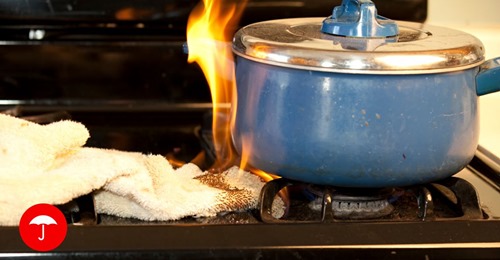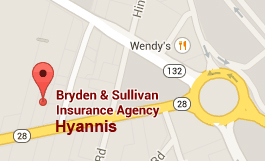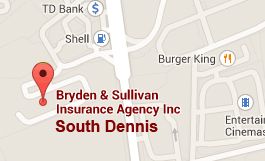Newsletter - Bryden and Sullivan Insurance Cape Cod
What to do if a Cooking Fire Flares up
- Written by Nacia Lipton National Property Director, Risk Control Nacia Lipton National Property Director, Risk Control
- Published: 07 December 2020 07 December 2020
- Hits: 1585 1585
Cooking is a common cause of home structure fires and home fireelated injuries. Whether preparing for a family dinner or making a quick snack, practicing safe cooking behaviors can help keep you and your family safe.
- Never leave your range or cooktop unattended while cooking. If you have to leave the room, turn your range or cooktop off.
- Wear short, close-fitting or tightly rolled sleeves. Loose clothing can hang down onto hot surfaces and can catch fire if it comes in contact with a gas flame or electric burner.
- Keep your cooking area clean and free of combustible materials. Food wrappers, oven mitts or other materials left on or near the stove may catch fire.
- Be sure to clean up any spilled or splattered grease. Built-up grease can catch fire in the oven or on the cooktop.
- Keep a fire extinguisher readily available. Having an extinguisher nearby is important, but you also need to have the correct type of extinguisher and know how to properly use it.
- Never throw hot grease in the garbage as it can ignite combustible materials. Be sure to let grease cool and consider disposing it in an old can, such as a metal coffee can.
- Do not store food or other items in your oven. It can be easy to forget there is an item in your oven, and this could catch fire while preheating.
What to Do If a Cooking Fire Flares Up
By exercising caution in your kitchen, you can help reduce the risk of a kitchen fire. But if a fire does flare up, you need to be prepared.
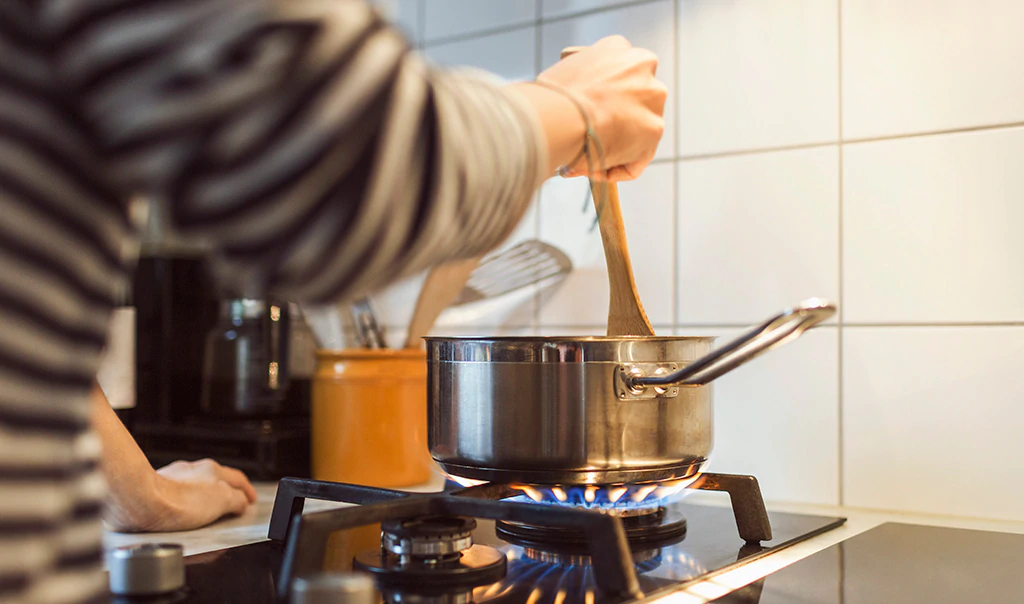
- Your safety comes first. If you cannot safely extinguish the fire, leave the scene, call 911 for help, and let the fire department control the fire.
- If a small fire flares up and you are going to try to extinguish it, call 911 for help first. A fire may grow out of control more quickly than you anticipate. It is safer to have help already on the way.
- Smother a grease fire – never throw water on a grease fire. The water can be super-heated and change to steam, and can cause severe burns. Also, it can cause oil to splash up and spread the fire. If a grease fire starts in a pan, smother the flames by sliding the lid – while wearing an oven mitt – over the pan. If safe to do so, turn off the heat source. Do not move the pan; keep the lid on until the fire is out and the pan is completely cool.
- If a fire starts in your oven, keep the door closed and turn off the heat source. Keeping the door closed will help smother the flames. Do not open the door until the flames are completely out.
- If a fire starts in your microwave, turn off the microwave and do not open it until the fire is completely out. Unplug the microwave only if you can safely do so.
Learn more about Bryden and Sullivan homeowners insurance to protect your home.
How to Pack a Car Safely
- Published: 18 June 2020 18 June 2020
- Hits: 1308 1308
As the summer months approach, so too, do thoughts of hitting the road for a family vacation. According to the U.S. Department of Transportation, nine out of 10 Americans drive to their travel destination.1
If you are among those planning to hit the road, remember that safe driving starts before you even leave the driveway. Securing luggage, maintaining vehicle balance and keeping clear lines of sight from the driver's seat are key elements in packing your car safely for the long drive.
Here are a few things to keep in mind as you load up your luggage, coolers and other vacation necessities:
6 Home Renovations that Can Affect Your Insurance
- Published: 18 June 2020 18 June 2020
- Hits: 1283 1283
If you're planning a home renovation, you may want to call your insurance agent first because this decision can impact your homeowners insurance. Some home renovations will change the amount of coverage you need, while others could even help you qualify for a discount.
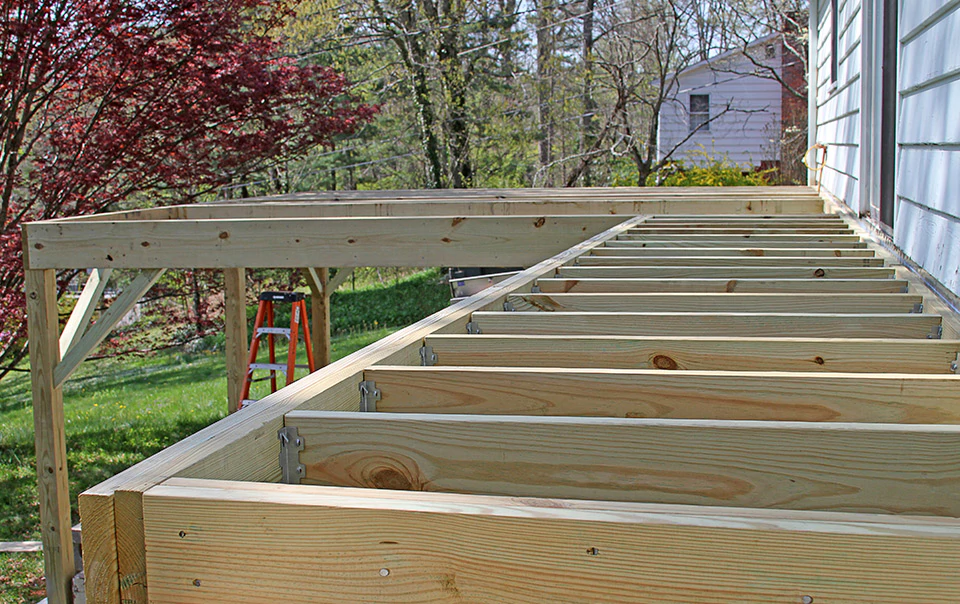
We cover six common scenarios that could affect your insurance, so you can plan ahead.
1. Building a New Addition
2. Building a Pool
3. Adding a Deck
4. Renovating the Kitchen
5. Finishing the Basement
6. Redoing the Roof
Read more: 6 Home Renovations that Can Affect Your Insurance
Massachusetts Hands-Free Driving Law: FourThings You Should Know
- Written by Bryden and Sullivan Bryden and Sullivan
- Published: 06 December 2019 06 December 2019
- Hits: 1530 1530
Governor Baker signed has signed a bill "Requiring The Hands-Free Use Of Mobile Telephones While Driving” to go into effect on Sunday, February 23, 2020.
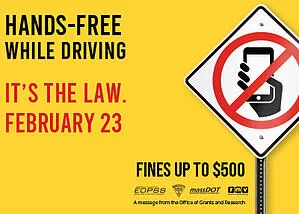 The law states that no operator of a motor vehicle (including motorcyles and bicycles) shall hold a mobile electronic device or use a mobile electronic device unless the device is being used in hands-free mode.”
The law states that no operator of a motor vehicle (including motorcyles and bicycles) shall hold a mobile electronic device or use a mobile electronic device unless the device is being used in hands-free mode.”
“Hands-free mode” is defined as use without the user holding or touching the device except to initiate the hands-mode feature of the device.
- 1st Offense: $100 Fine
- 2nd Offense: $250 Fine plus requirement to complete an educational program on distracted driving prevention.
- 3rd Offense: $500 fine for third or subsequent offense, plus completion of educational program on distracted driving prevention.
Emergency Exception
The law does allow “emergency” use of a hand-held device to:
- Report a disabled vehicle or accident on a roadway
- Request medical attention or assistance
- Request police intervention, fire department or other emergency services for personal safety, or to otherwise ensure the safety of the public
To access a PDF copy of the Law, please click here. Download PDF brochure from Mass. Association of Insurance Agents (MAIA)
Fire Safety Tips for Holiday Cooking
- Written by Super User Super User
- Published: 22 November 2019 22 November 2019
- Hits: 967 967
Did you know that Thanksgiving is number one day for home fires in Massachusetts?
"This holiday has the most home fires, and the majority are cooking fires,” says State Fire Marshal Peter J. Ostroskey. “As your families gather to celebrate this holiday, keep everyone safe. Start by making sure you have working smoke and carbon monoxide (CO) alarms.”
Cooking activities have been the cause of 87 percent of the 651 Thanksgiving Day fires in Massachusetts over the last five (5) years. State Fire Marshal Ostroskey offered these cooking safety tips that everyone can follow to prevent fires:
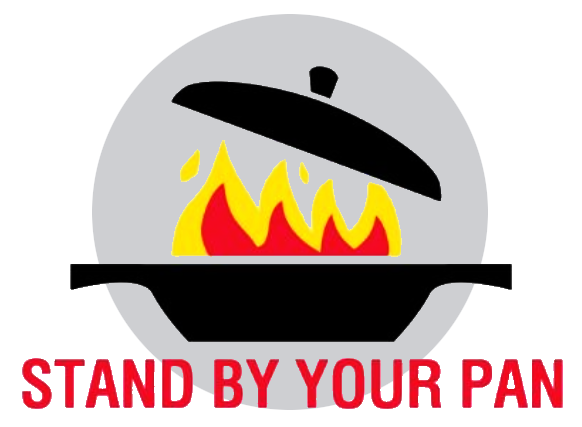 |
Cooking Safety Tips |
|
| 1 | Check to make sure your oven is empty before turning it on. | |
| 2 | Wear short or tight-fitting sleeves when cooking. | |
| 3 | Turn pot handles inward over the stove. | |
| 4 | Remember to “stand by your pan” and stay in the kitchen when boiling, frying or broiling. | |
| 5 | Use a timer when baking or roasting and never leave the house with the oven running. | |
| 6 | The best way to respond to a stovetop fire is to “put a lid on it” and turn off the heat. | |
| 7 | The best way to respond to an oven or broiler fire is to keep the oven doors closed and turn off the heat. | |
| 8 | If the fire is not quickly snuffed out, leave the house and call 9-1-1 from outside. | |
Nine Smartphone Distracted Driving Trends
- Written by Super User Super User
- Published: 28 December 2015 28 December 2015
- Hits: 5805 5805
The smartphone is changing how we live — and drive.
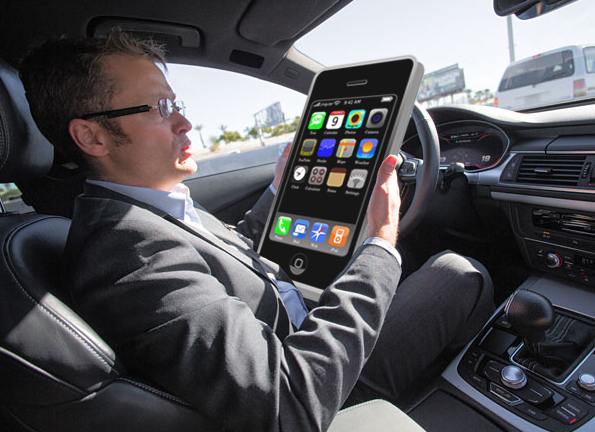
A new survey from State Farm reveals an alarming increase in the number of drivers using their smartphone for Web-based activities, including social media, GPS and e-mail.
While drivers continue to be in favor of laws restricting cellphone use while driving, they are still using the devices while behind the wheel, according to the annual study.
10 States with the Rudest Drivers
- Written by Super User Super User
- Published: 28 December 2015 28 December 2015
- Hits: 38205 38205
| State | Most common complaint: | Quotes |
| 1. Idaho | Slow drivers | "The roadways of Idaho present a dichotomy of drivers: Those who are moving so slowly that they’re judged to be rude, and the aggressive drivers who speed around them and flip them off. Together, with their opposite yet equally vexing styles of driving, they push Idaho to the top of the rankings." |
| 2. Washington, D.C. | Aggressive drivers | “Driving in D.C. can be compared to the recklessness of our politics: self-serving, abrasive and unsafe.” |
| 3. New York | Disrespect | "New Yorkers are 'known for their lack of respect to other drivers. It’s not often that you see a driver in New York raise their hand [politely] or make some other gesture saying thank you to another driver for letting them through. What’s more, pretty much no driver in New York bothers to indicate before turning.'” |
| 4. Wyoming | Selfish drivers | "A few years back, as reported in the Wyoming Tribune Eagle, Men’s Health magazine gave drivers in Cheyenne an “F” for quality of driving. The newspaper reported that “running red lights, disregarding stop signs, merging without signaling and speeding are some common traffic problems that lead to auto accidents.” |
| 5. Massachusetts | Overall rudeness |
“Massachusetts has the rudest drivers I have ever encountered. I rode in the car with one of my clients, and she never stopped shaking her fist at other drivers, spewing insults and profanities, tailgating and rushing lights. It was as if she owned the road, and other drivers were trespassing and in her way.” (Bryden and Sullivan don't believe this data was collected on the Cape, where rates are much lower than in Boston!) |
| 6. Vermont | Speeding | According to a 2010 study from DriverSide.com, the Green Mountain State is No. 3 in the nation for speeding tickets issued per capita. |
| 7. Delaware | Tailgating | “When doing the speed limit, I should not have to wonder about the make of a vehicle behind me, due to the fact the car is tailgating me so horrifically I cannot even see its hood!” |
| 8. New Jersey | Cutting it too close | ”People in our state love to try and pull onto the road with far less space than they should, never like to let the other car merge in, and don’t seem to realize that yellow means ‘slow down.’ And then there’s the ‘Jersey Slide’: cutting across two or more lanes with the same blinker – if they use one at all. A favorite phrase of one of my female acquaintances is, ‘Learn to [expletive] drive!’ which she learned from an aunt who [nonetheless] loves to text, email and Facebook while on the road.” |
| 9. Nevada | Aggressive driving |
"It’s more than rude, it’s really dangerous. You have to be totally on the defensive [when] driving here. You see accidents almost every time you go out. The worst thing that Las Vegas is guilty of is that you just know that whenever there is a light or a left-turn signal, there will be at least two or three cars going through the red. And there are always those folks, no matter where you drive on the freeway, who will be darting in and out just to get one more space ahead."
|
| 10. Utah | Speeding | "Recent Utah resident Matt Stubbs says it appears the state’s motorists are all in a race. 'But nobody knows where it ends or how to get to the finish. So everyone drives 5, 10 or 15 miles per hour over the speed limit.'" |
What Makes Drivers mad?
According to Insure.com, which surveyed 2,000 drivers as part of its study,
- 47% of respondents said that seeing others talking on a cellphone while driving made them maddest on the road, while
- 37% cited tailgating as their number-one annoyance.
- Beyond that, 35% said it was not signaling for turns,
- 28% said it was weaving in and out of lanes, and
- 26% said it was simply driving too fast.
6 Steps for Storm Preparedness on Cape Cod
1. Know your Risk.Wind Storms, Hurricanes, Blizzards and Flooding are our most immediate concerns on Cape Cod. It's always best to have your own Emergency Preparedness Plan. You can protect your local emergency management organization to determine if there are already community-wide preparedness materials you can have, including evacuation routes, shelters and communication systems. |
|
2. Assemble or Update your Emergency Kit.Stock up on basic supplies you might need if you had to evacuate your home quickly. Items may include food, water, first aid supplies, medication, batteries, blankets and pet supplies. Put these items in a lightweight, waterproof container an dplace it somehere that can be easily accessed in an emegrency. |
|
3. Create a Communication Plan.Your family might not be together when disaster strikes. Have a discussion with your kids about emergency preparedness, including where you can meet and how everyone can get in contact if the unexpected happens. |
|
4. Practice your Plan.Mock scenarios with your family and even your entire community can help everyone understand how to prepare for, react to and recover from a disaster with confidence. That way, if an emergency were to strike, each member would know exactly which tasks they are responsible for to keep themselves and others safe. |
|
5. Prepare your Home.You can reduce the risk of injury to yourself and damage to your home by preparing your property for disaster. For example. in the case of a hurricane, it is recommended to board all windows and doors with hurricane shutters, and turn refrigerators and freezers to the coldest setting in order to preserve food, whereas a blizzard and freezing temps require salting the driveway and letting cold water drip from the faucet to prevent frozen pipes. |
|
6. Document and Insure your property.Under certain circumstances, damage to your home may not be covered under a basic homeowner's insurance policy. Talk to Bryden and Sullivan insurance agents to determine if you need any additional coverage for the risks your area is particularly susceptible to, such as tornadoes, wildfires, hurricanes and more. |
|

